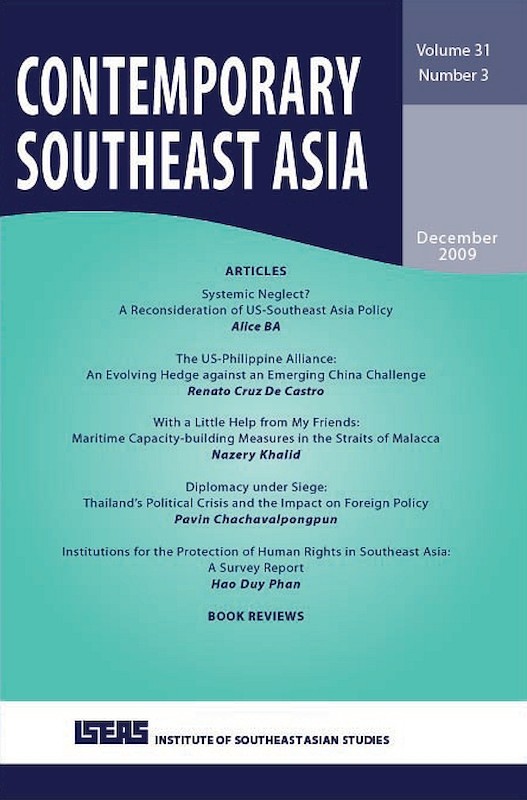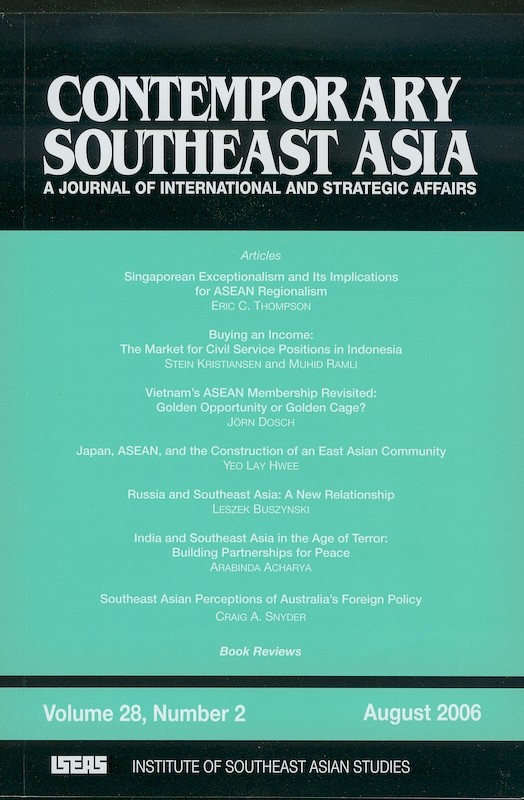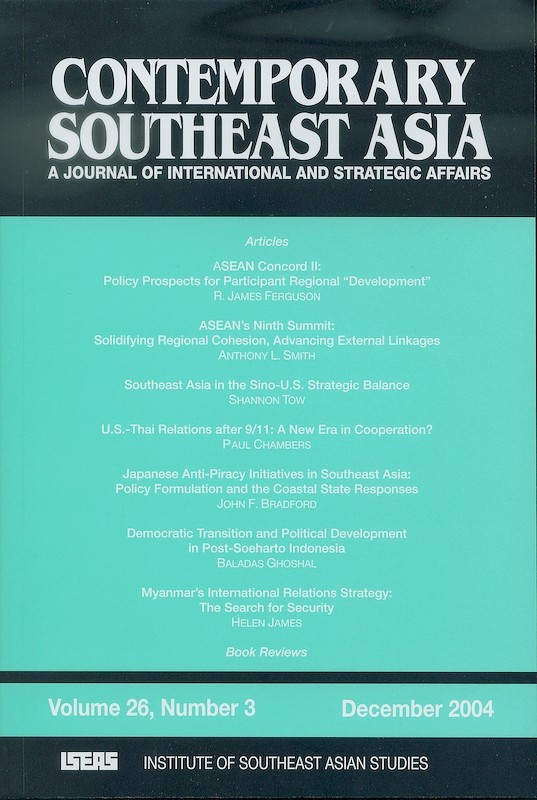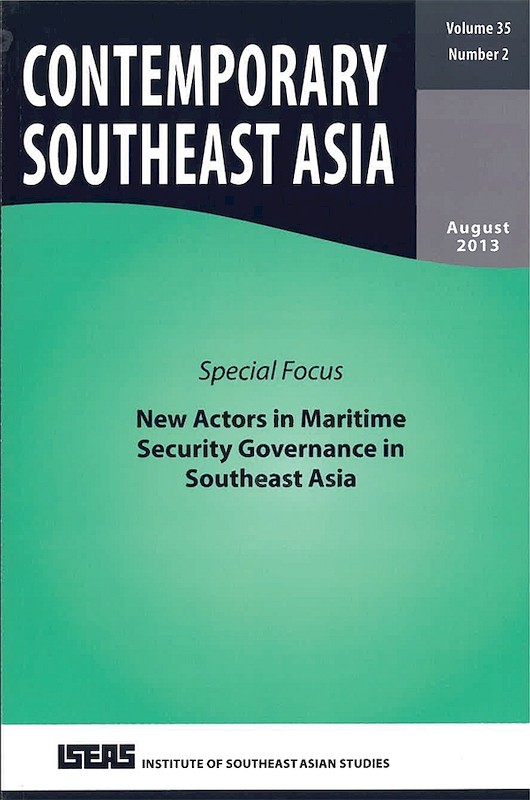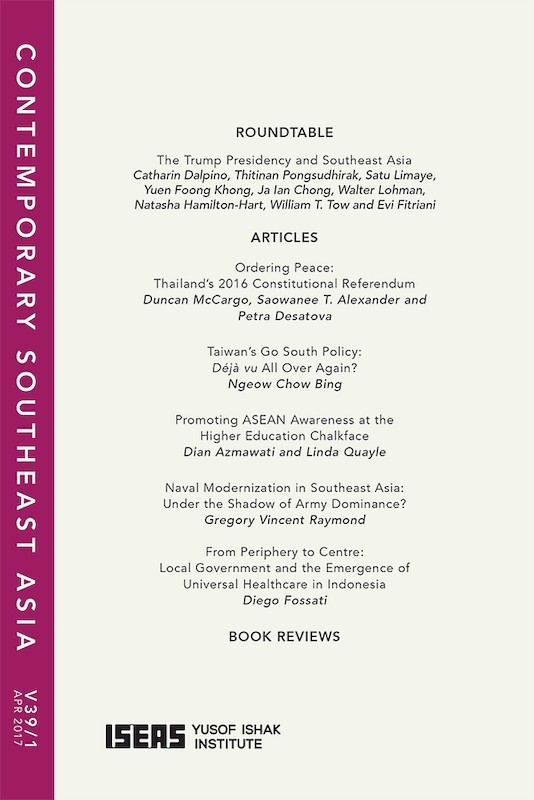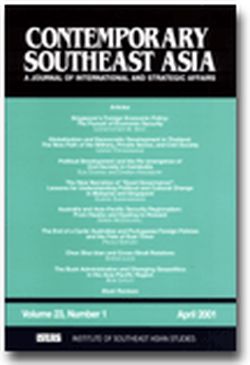Contemporary Southeast Asia: A Journal of International and Strategic Affairs Vol. 26/1 (Apr 2004)

Date of publication:
April 2004
Number of pages:
192
Code:
CS26/1
Contents
-
Contemporary Southeast Asia: A Journal of International and Strategic Affairs Vol. 26/1 (Apr 2004)
-
Preliminary pages
- ARTICLES
-
Malaysia's National Security: Rhetoric and Substance, by Hari Singh, author see abstractAnalyzing national security entails both its substantive and rhetorical dimensions. These themes, examined in the Malaysian context, highlight the external and internal dimensions of national security, the substantive aspects being more pronounced in the former, and rhetoric being more salient in the latter. While the security of the political regime is a determinant of both domains, its influence was greater in the internal-rhetorical quadrant of Malaysias national security. However, in the post-Cold War period, strategic and economic imperatives have tended to blur the distinction between the internal and external realms of the state, resulting in domestic politics becoming more susceptible to the dominant values of the international system. This development, taken together with localized sociopolitical change, has induced greater plurality in Malaysian politics. While the rhetoric of national security still has its instrumental value, it is however becoming more problematic for political elites to advance their interests in the name of the state.
-
Thaksin and the Politics of Domestic and Regional Consolidation in Thailand, by N Ganesan, author see abstractThai-Cambodian bilateral tensions in 2003 were not an accurate reflection of Thailand's recent foreign policy initiatives. Thailand has embarked on its most aggressive foreign policy thus far to seek regional peace and stability, partly driven by domestic political consolidation and a reformist/populist agenda under Thaksin Shinawatra and his Thai Rak Thai party. This article first examines Thai politics and foreign policy from the Chatichai Choonhavan governments Indochina Initiative, then focuses on the domestic and foreign policies of the Thaksin government since 2001 and the implications for Thailand and the region. It is argued that the ongoing initiatives of the Thaksin government have significant implications for domestic politics while foreign policy initiatives are to be understood within the Thai tradition of attempting to perform a regional leadership role.
-
Post-Crisis Restructuring: Foreign Ownership, Corporate Resistance and Economic Nationalism in Thailand, by Chris Dixon, author see abstractThe IMF prescriptions attached to the rescue loans agreed with Indonesia, South Korea and Thailand during 1997 involved substantial and immediate liberalization, particularly of controls over foreign ownership. In Thailand there was rapid and far reaching relaxation of the regulations that had effectively prevented majority foreign ownership of Thai registered companies. This was followed by a large-scale inflow of foreign M&A (Merger and Acquisitions) investment into Thai companies. However, available evidence suggests that the overall level of foreign control remains extremely limited. By far the largest recipient of investment was banking, where despite substantial changes in ownership patterns, direct majority foreign control has only involved a small proportion of the sector. It is argued that the limited development of foreign control in the Thai corporate sector as whole reflects ownership patterns and business practice, reinforced by the limited progress in reforming the legal and corporate governance frameworks and the support of the domestic sector by officials and politician--the latter becoming much more overt following the election of the Thaksin Shinawatra government. There is here an in-built resistance to corporate reform and liberalization of foreign ownership regulations.
-
Minding the Gaps: The Bush Administration and U.S.-Southeast Asia Relations, by Satu P Limaye, author see abstractThe period from the beginning of the George W. Bush Administration in January 2001 to President Bush's unprecedented October 2003 visit to four countries in Southeast Asia the Philippines, Thailand, Singapore and Indonesia marks an especially distinctive phase in United States-Southeast Asia relations. The key contention of this article is that over the next three years both the U.S. and Southeast Asia were adroit in minding the gaps in relations, but for reasons that do not address fundamental questions regarding respective views or interests towards each other. During the 2001-2003 period, several factors contributed to facilitating the narrowing of gaps. First, early Bush administration approaches to foreign and security policy were adjusted and moderated as reflected in the new National Security Strategy. Second, the U.S. emphasis on the global war on terrorism cast a new importance to terrorist activities in Southeast Asia. While such a mutual approach in relations maximizes near and mid-term cooperation, it leaves open to question longer-term trends in U.S. and Southeast Asian thinking about each other and the broader Asia-Pacific security environment if and when the counter-terrorism environment is less pressing.
-
Australia's Strategic Identity Post-September 11 in Context: Implications for the War Against Terror in Southeast Asia, by Bruce Vaughn, author see abstractThe article asserts that Australia's history, geography and ongoing definition of its national identity, relative to Asia and the West, are central to its future geopolitical disposition. How these dynamics are resolved will influence Australia's relationships with Southeast Asian states. It takes the position that the war against terror in Southeast Asia offers Australia the opportunity to add a new layer of substance to its relations with Southeast Asian states by offering meaningful counter-terrorism assistance in a cooperative manner. It also draws the conclusion that Australian national interests would be best served by establishing an independent Pacific identity, that builds on its values, continues its close strategic relationship with the United States (U.S.) and recognizes the importance of constructive, and mutually beneficial, relations with Southeast Asia, as well as the value of close relations with Asia as a whole. Such a path will enable Australia to avoid having to choose between Asia and the West.
-
Southeast Asia and China: The Role of History and Culture in Shaping Future Relations, by Martin Stuart-Fox, author see abstractDespite the position of the United States as de facto global hegemon, China is a rising power in the world. As Chinese power grows, the projection of Chinese influence will be felt most acutely in Southeast Asia. Whether to accommodate, contain or resist China will depend on future developments that none can foresee, including Chinese ambitions, the policies of other international players (the U.S., Japan), and the cohesion or fragility of the Association of Southeast Asia Nations (ASEAN). This paper argues that in deciding how best to deal with China, two factors that will influence the countries of Southeast Asia are their own long histories of bilateral relations with China and their own differing conceptions of how foreign relations should be conducted. This is to argue that history and culture are central to any understanding of the likely future shape of China-Southeast Asia relations. Only by taking history and culture into account will analysts be in a position to predict how the mainland and maritime states of Southeast Asia are likely to respond to a more powerful, confident and assertive China.
-
Forging an ASEAN Identity: The Challenge to Construct a Shared Destiny, by Michael E Jones, author see abstractASEAN has formulated a planned integration among its ten member nations and has challenged its citizens to embrace a regional identity. This article raises and attempts to answer the following questions: How might ASEAN develop strategies to enable citizens in transitioning from nation-state mentalities to regional and possible cultural citizenry? How will the regional and national governing bodies facilitate the necessary empowerment of diverse populations to form an ASEAN identity? What sorts of affiliations will engender the necessary social capital to develop civic-minded people with a sense of belonging together? How might education play a role in this process? These questions are raised on the basis of the argument that the call for ASEAN identity delivers a challenge to construct dynamic institutions and foster sufficient amounts of social capital. The underlying assumption is that the creation of a regional identity is of primary special interest to ASEAN and the intent of the Vision policy document was to re-assert the belief in a regional framework designed as an action plan related to human development and civic empowerment. Accordingly, these assumptions will be the basis for recommendations and strategies in developing a participatory regional identity.
-
Indonesia's Non-State Actors in ASEAN: A New Regionalism Agenda for Southeast Asia?, by Alexander C Chandra, author see abstractThe main focus of this article is to provide an analysis of the involvements of the Indonesian non-state actors in ASEAN. More specifically, it aims to analyze the contemporary attitude of Indonesian non-state actors towards ASEAN and its activities. The main argument here is that despite a certain indifference towards the Association, the majority of Indonesian non-state actors still positively value the existence of ASEAN. However, if the Association wishes to gain wider public support in the future, it should abandon the exclusive manner in which it conducts its operations. This, amongst other things, will enable the greater participation of non-state actors in the Associations main activities and decision-making processes. In the more democratic country that Indonesia is today, domestic non-state actors will continue to demand a more open and transparent ASEAN.
- BOOK REVIEWS
-
BOOK REVIEW: Militant Islam in Southeast Asia: Crucible of Terror. By Zachary Abuza, by Kumar Ramakrishna, author
-
BOOK REVIEW: Challenging Authoritarianism in Southeast Asia: Comparing Indonesia and Malaysia. Edited by Ariel Heryanto and Sumit K Mandal, by Wang Gungwu, author
-
BOOK REVIEW: Reforming Thai Politics. Edited by Duncan McCargo, by Surin Maisrikrod, author
-
BOOK REVIEW: Whither Free Trade Agreements? Proliferation, Evaluation and Multilateralism. Edited by Jiro Okamoto, by Eul Soo-Pang, author
-
BOOK REVIEW: The Transformation of Southeast Asia: International Perspectiveson Decolonization. Edited by Marc Frey, Ronald W Pruessen and Tan Tai Yong, by Shamsul A B, author

